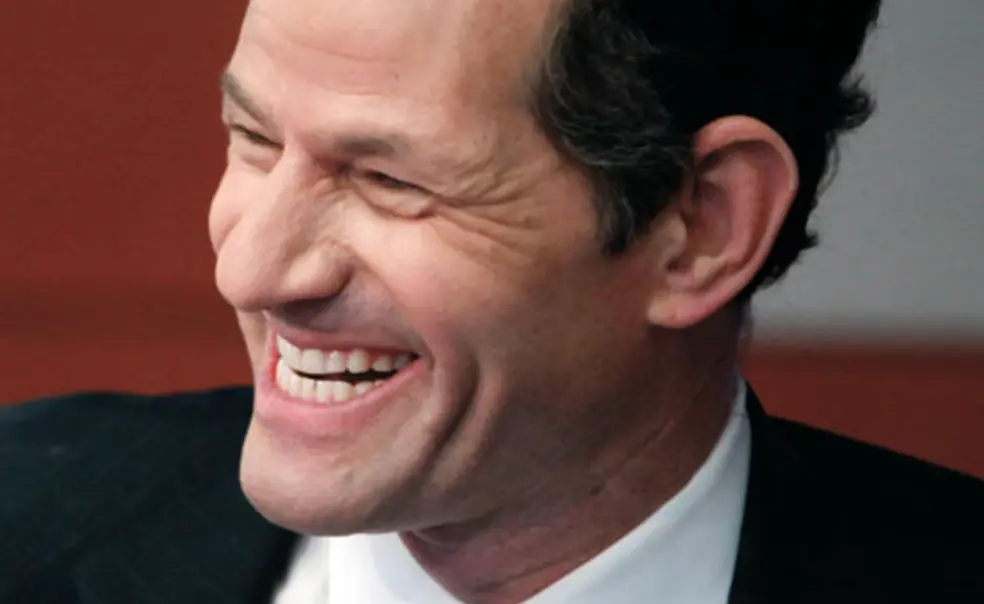A moment with ... Eliot Spitzer '81, governor-turned-journalist
For a time, Eliot Spitzer ’81 went the way of other politicians who had fallen from grace. The hard-charging former governor of New York was out of the spotlight, focused on his wife and daughters, returning to the real estate business that his father had built into a Manhattan powerhouse. But starting with occasional columns on economics and politics for Slate.com, Spitzer began to construct a new public life. In a series of interviews, he has been frank, sheepish, and self-deprecatory about the scandal that led him to resign from office in 2008, after The New York Times revealed that the governor had patronized call girls. This fall, Spitzer and columnist Kathleen Parker will debut a prime-time discussion program on CNN that Spitzer describes as a “thoughtful conversation about current affairs.”
On your new show, will you be a journalist, commentator, entertainer, or what?
The one word I would take off your list is “entertainer.” The show is designed to be serious, but it’s not a college seminar. We’re hoping to have a deeper conversation that’s lively and broad in ideological perspective, and we’ll let people decide who has the better argument.
Do you have any misgivings about joining a business that seemed to take such pleasure in your downfall? After all, you were hounded for months by photographers and TV crews.
I’ve been in politics, so in terms of joining a profession in low esteem — been there, done that. CNN has a rigor that generates respect. Technology has exponentially increased access to information, and that has permitted both the good and the bad to expand in journalism. Unfortunately, both politics and journalism have tested the bottom in terms of what appeals to people, but that merely mirrors human nature. Look, coarse entertainment is not new — we had the Roman Colosseum. I don’t blame journalists; I don’t blame politicians. I simply say that’s who we are. I know great journalists who dig and do great work, and I know journalists who are happy to traffic in cheap, tawdry material. On our show, we’re going to discuss what we think matters.
Was it your celebrity and notoriety that made you attractive to CNN, or are they hiring you for your steel-trap mind or your dashing looks?
I’d like to think it was more the substance of what I did as attorney general and governor, but of course, I realize that my career had extreme peaks and valleys. That entire complex created
a combination of notoriety and celebrity and interest that is real.
Most of your adult life has been very much in the public eye. After the scandal, didn’t you want to find a more private kind of work?
There was a very powerful argument that said, OK, you’ve experienced the heights and depths of public life, and the next chapter should be completely different. But the opportunity, if you care about these issues, can be very hard to reject. My dad always made it clear that financial success was only one very small measure of a good life. It’s a very hollow measure of what you’re all about.
Why would you want to go back to such a life so soon after your personal trauma became fodder for mockery and humiliation?
Schadenfreude is part of our psyche in this country, and maybe there’s something healthy about that. It’s our way of keeping in check people who have shown too much hubris. On the other hand, there is a belief that people get second and third acts in America if they deserve it. Throughout this, people on the street have been incredibly supportive. There is a greater willingness in this country to be open and to move away from the whitewashed narratives we read in first grade about the lives of the presidents. We may still be behind other countries in that kind of attitude. In our culture, we still have this desire to see public people live a puritanical life.
As a result of the scandal and your openness about talking about the pain you caused your family, you are asked questions that no one ever would have thought to ask you as a prosecutor or governor. One interviewer asked, ‘What is love?’ Are you comfortable taking on that sort of question?
I’d rather talk about macro-economic policy.
— Interview conducted and condensed by Marc Fisher ’80













No responses yet